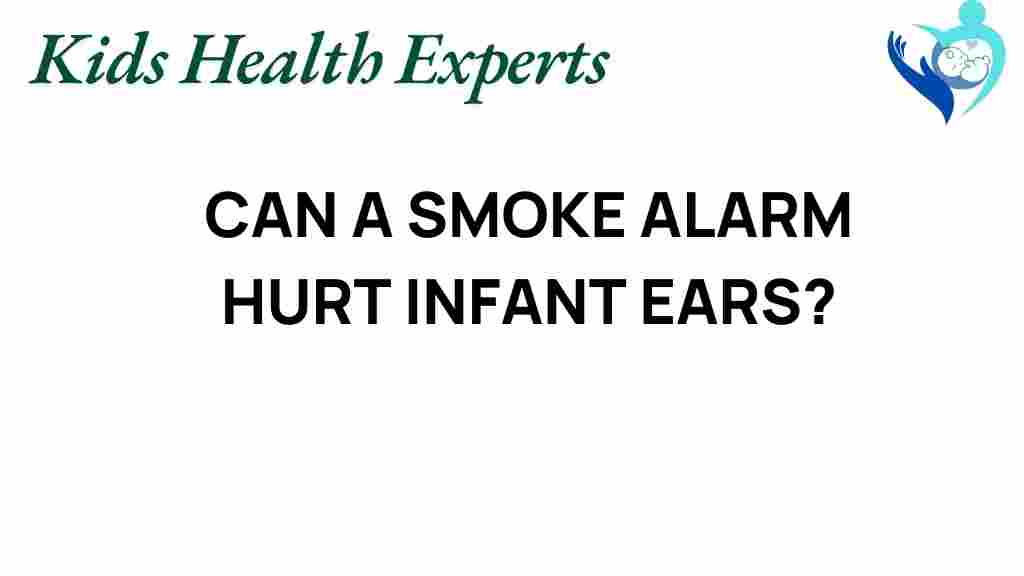The Surprising Impact of Smoke Alarms on Infant Hearing
As parents, ensuring the safety and health of our infants is our top priority. One often-overlooked aspect of home safety is the role of smoke alarms. While they are essential for alerting us to fire hazards, many parents are concerned about their impact on infant hearing and overall auditory health. In this article, we will explore how smoke alarms affect infants, discuss parental concerns regarding noise exposure, and provide practical tips for maintaining both safety and hearing health in your home.
Understanding Smoke Alarms and Their Importance
Smoke alarms are vital safety devices that detect smoke and provide early warnings of potential fires. Their loud alarms can be lifesaving, granting precious minutes to escape dangerous situations. However, the sound levels of these alarms can reach up to 85 decibels, which raises questions about their effects on children’s health, particularly infant hearing.
- Protects lives by alerting occupants to smoke and fire.
- Reduces the risk of smoke inhalation.
- Provides peace of mind for families.
How Smoke Alarms Work
Smoke alarms typically use one of two technologies: ionization or photoelectric sensing. Each type has unique features:
- Ionization alarms: Better at detecting fast-burning fires.
- Photoelectric alarms: More effective for smoldering fires.
Regardless of the type, the alarm sound is designed to be loud enough to wake sleeping individuals, including infants, which leads us to our primary concern regarding noise exposure.
The Effects of Noise Exposure on Infant Hearing
Infants are particularly vulnerable to loud sounds, and research indicates that excessive noise exposure can lead to hearing loss and other auditory issues. The World Health Organization recommends that noise levels in residential areas should not exceed 55 decibels during the day and 40 decibels at night to ensure healthy auditory development.
Given that smoke alarms can produce sounds exceeding these recommended levels, parents naturally worry about the implications for their infants.
Parental Concerns About Smoke Alarms and Hearing Health
Many parents express valid concerns about the impact of smoke alarms on their infants’ hearing. These concerns include:
- Hearing Damage: Continuous exposure to loud noises can damage the delicate structures in an infant’s ear.
- Sleep Disruption: Loud alarms can wake infants from deep sleep, affecting their overall rest and health.
- Long-term Auditory Health: There are fears that repeated exposure to loud sounds might lead to long-term hearing issues.
Steps to Mitigate Noise Exposure from Smoke Alarms
While smoke alarms are crucial for safety, there are ways to mitigate their impact on infant hearing:
1. Choose the Right Smoke Alarms
Select smoke alarms with lower sound levels or those that emit a gentler tone. Some alarms come with a “low battery” chime that is less jarring than the full alarm sound.
2. Positioning of Smoke Alarms
Install smoke alarms in strategic locations, away from where the infant sleeps. Ensure they are outside of bedrooms or in hallways rather than directly above cribs or play areas. This positioning can reduce the noise exposure to infants.
3. Regular Maintenance and Testing
Regularly test smoke alarms to ensure they are functioning properly. A malfunctioning alarm can produce irregular sounds that may be startling. Additionally, replace batteries as needed to prevent the low-battery alert from becoming a nuisance.
4. Utilize Smart Smoke Alarms
Consider investing in smart smoke alarms that can send alerts to your phone or sound a less alarming tone. These devices can be especially useful for parents who want to keep infants undisturbed while still being alerted to potential danger.
Troubleshooting Tips for Smoke Alarms
If you find your smoke alarm is too loud or disruptive, here are some troubleshooting tips:
- Check the Type: Ensure you have the right type of alarm for your home and needs.
- Test Regularly: Conduct monthly tests to check the sound levels.
- Readjust Locations: If the alarm is too close to the infant, consider relocating it.
- Consult with Professionals: If unsure, consult with a safety expert to find the best solution for your home.
Conclusion: Balancing Home Safety and Infant Hearing
While smoke alarms are essential for home safety and protecting lives, it’s crucial to address the concerns surrounding infant hearing. By understanding the sound levels these alarms produce and taking steps to mitigate noise exposure, parents can create a safer home environment without compromising their infant’s auditory health.
Ultimately, the key is to be proactive—choose the right alarms, position them wisely, and ensure they are properly maintained. With these measures in place, you can rest easy knowing that your home is safe and that your child’s hearing is protected.
For more information on maintaining a safe environment for your children, visit this resource.
And for further insights on auditory health and noise exposure, check out this article.
This article is in the category Conditions and created by KidsHealthExperts Team
